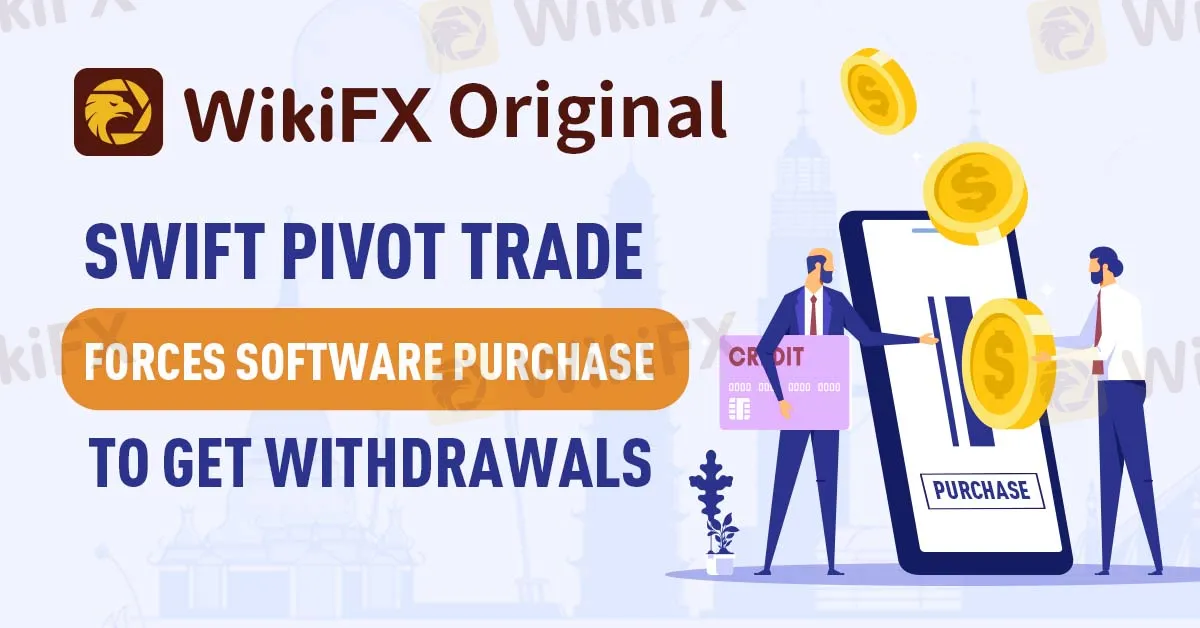简体中文
繁體中文
English
Pусский
日本語
ภาษาไทย
Tiếng Việt
Bahasa Indonesia
Español
हिन्दी
Filippiiniläinen
Français
Deutsch
Português
Türkçe
한국어
العربية
Swift Pivot Trade Forces Software Purchase to Get Withdrawals
Abstract:Have you ever heard of a special software that you have to purchase from your forex broker just to get your withdrawals approved? This is another day that WikiFX heard of a new scam strategy that a forex broker imposes on its clients.

Swift Pivot Trade (SPT) is a forex broker that is established in America last year. It is a brokerage firm that provides the trading of currencies, indices, commodities, and stocks. Its official website is https://swiftpivottrade.com/.
This is the first Exposure article that WikiFX has ever received in relation to SPT. It was submitted by a victim named Philisiwe from South Africa.
A little background of her story:
She was approached by a lady named Elizabeth on a social media platform named Ti***k who told her that depositing money with SPT could bring her passive and guaranteed profits. However, when she saw that her account was growing with profits, she requested to withdraw her funds. She was turned down and was told that she needed to purchase a special software that allows the withdrawal to be directly credited into her bank account. After she purchased that software, she still could not withdraw a cent up to this day.


Below are the screenshots provided by Philisiwe that outline the process of her being scammed by SPT and Elizabeth on Whatsapp:






Upon checking WikiFXs free database, we have found that SPT is a forex broker that has less than 1.0 Wikiscore. It is new, does not have any regulatory status, and does not hold a valid license to support its operation.

On the other hand, in one of the emails that the Philisiwe received from SPT, it could be possible that SPT is the predecessor of Epic Option Trading, that is also a forex broker from the United States that is neither regulated nor carries a valid license.

WikiFX sincerely advises our users to download our free mobile app for your personal benefit and only choose forex brokers that have at least a WikiScore of 7.0 to be safe than sorry.

Disclaimer:
The views in this article only represent the author's personal views, and do not constitute investment advice on this platform. This platform does not guarantee the accuracy, completeness and timeliness of the information in the article, and will not be liable for any loss caused by the use of or reliance on the information in the article.
Read more

Unmasking the ‘Datuk’: The Anatomy of a RM638,205 Investment Scam
Authorities in Malaysia have launched an extensive investigation into a fraudulent stock investment scheme, which has resulted in losses amounting to RM638,205.

Unmasking the ‘Datuk’: The Anatomy of a RM638,205 Investment Scam
Authorities in Malaysia have launched an extensive investigation into a fraudulent stock investment scheme, which has resulted in losses amounting to RM638,205.

ATFX Enhances Trading Platform with BlackArrow Integration
ATFX integrates the BlackArrow trading platform, offering advanced tools for forex, crypto, and stocks with automation and real-time analytics for traders.

Exposing the Truth: What Happened with the Losses of Thousands of Dollars on the GlobTFX Platform?
The facts are clear and undeniably shocking—GlobTFX has caused significant financial losses to well-known traders in the Arab world. Eighteen victims have confirmed a total loss exceeding $22,372! But this is just the tip of the iceberg…
WikiFX Broker
Latest News
Brazilian Man Charged in $290 Million Crypto Ponzi Scheme Affecting 126,000 Investors
Become a Full-Time FX Trader in 6 Simple Steps
ATFX Enhances Trading Platform with BlackArrow Integration
IG 2025 Most Comprehensive Review
SEC Drops Coinbase Lawsuit, Signals Crypto Policy Shift
Construction Datuk Director Loses RM26.6 Mil to UVKXE Crypto Scam
Should You Choose Rock-West or Avoid it?
Franklin Templeton Submitted S-1 Filing for Spot Solana ETF to the SEC on February 21
Scam Couple behind NECCORPO Arrested by Thai Authorities
Top Profitable Forex Trading Strategies for New Traders
Currency Calculator






